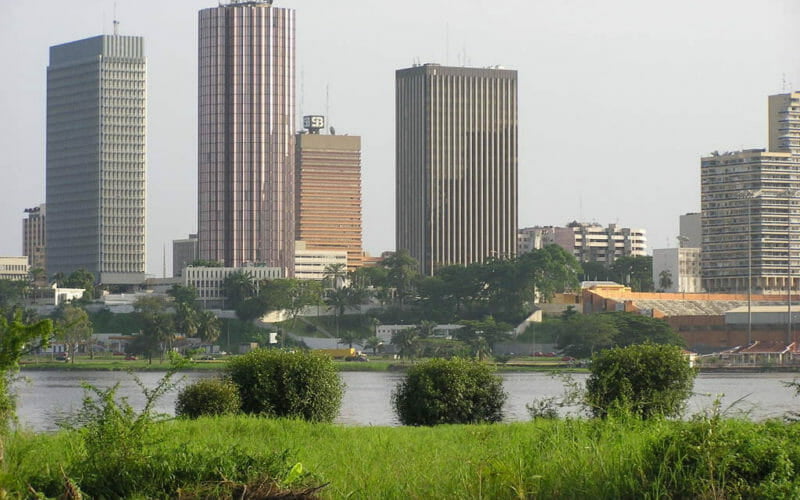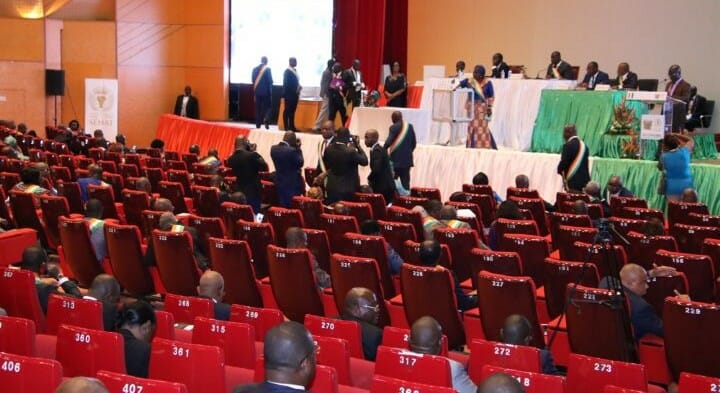Why President Ouattara groomed Prime Minister Gon Coulibaly to succeed him

A NEWS ANALYSIS
BY BINTA FOFANA
[Editing by Peter Sesay]
Last Thursday, it was literary midnight here in Abidjan—a time full of symbolism—when Cote d’Ivoire’s president, Alassane Ouattara, raised the hand of his prime minister, Amadou Gon Coulibaly, in a gesture of approval of the latter’s choice as the party’s candidate for the upcoming 31 October presidential election, while the room full of the party’s members cheered.
This event, which ended three years of enigma and speculation as to whether President Ouattara would run for a third term as he said the revised, 2016 constitution allowed him to. The nation and international observers breathed a sigh of relief when, exactly a week earlier, Ouattara formally announced before the parliament that he will not seek a third term.
Gon Coulibaly was chosen by the Rally of the Houphouetists for Democracy and Peace, RHDP, as the culmination of a high-profile meeting of the party. During the announcement ceremony, Ouattara pointed out it was the party’s decision, not his own. But everyone saw it coming. Nobody doubts it’s the will of the president to see his associate of several decades carry the torch.
The president could not have hailed the choice of Gon Coulibaly in stronger terms:
“Whether it’s on the personal, professional or political levels, in my soul and conscience, Amadou Gon Coulibaly is the person I am leaving you to be the head of state. You’ve trusted me; in turn, I ask you to trust him. Yes, trust Amadou Gon Coulibaly. He has the capability, the intelligence, the perseverance and the courage to continue the work for development and peace. I vow to stay by your side to accompany him in this noble mission.”

Cote d’Ivoire’s political history has been complex, at times messy, over the past two decades since former president Henri Konan Bédié—who succeeded the nation’s founding father, Félix Houphouët-Boigny, in December 1993—was toppled in December 1999. Part of the intricacies is the collapse, about two years ago, of what looked like a sacro-saint alliance between former president Henri Konan Bédié, former prime minister and former speaker of the parliament Guillaume Soro, and the man both helped rise to power after former president Laurent Gbagbo refused to step down despite losing the October 2010 election: Alassane Ouattara.
Ouattara apparently defaulted on his alleged promise to return the favor to Bédié by supporting a candidate from Bédié’s party, PDCI-RDA, for the upcoming 31 October presidential election. Instead, the current president preferred a candidate emerging from a coalition of parties including his own party, the RDR, and Bédié’s PDCI-RDA. Bédié’s objection led to a spectacular split between two political titans who once displayed in public a rarely-seen chemistry, with Ouattara, the youngest, now 78, publicly referring to Bédié, now 85, as “my senior brother,” while Bédié affectionately called him “my baby-brother.”
Concurrently, relation between Ouattara and former prime minister and speaker of the parliament Guillaume Soro soured to a point of no-return where, three months ago, the government issued an international arrest warrant for him. Soro who, by then, had announced his candidacy to be president, found himself in exile in France.
Also: President Faure Gnassingbé declared winner of Saturday’s election
Ouattara never stated his intention to stop either Bédié or Soro from running, though that old practice is much alive in West Africa today. In fact, when the president announced his ‘threat,’ on 30 November 2019, to run for a third term if other members of his generation run (a clear reference to former presidents Bédié and Laurent Gbagbo), he stated emphatically:
“No one will be excluded, for that’s what triggers the crises. Yes, gone are the times of exclusion. I am not one of those who bar some candidates from running in order to stay in power.”
But it’s all too clear the president does not want to leave state power in just any hands when he steps down at the end of this year.
Ouattara faced two challenges when he took charge as president in April 2011: to prop up the economy, and to heal the Ivorian nation shattered by wars and division along ethnic and regional lines.
The result in terms of reconciling Ivorians with themselves is rather mixed. The president has been given a failing grade by many, both at home and abroad. To the critics, the prosecution of the perpetrators of the post-election violence that climaxed into the civil war is nothing short of a ‘victor’s justice.’ That, despite the president pardoning in August 2018 eight-hundred people—including former first lady Simone Gbagbo—who were convicted for their role in the war that killed 3,000 people. Indeed, some of the perpetrators of violence on the Ouattara side of the civil war have never been brought to justice.
Victor’s justice and the uphill road to national reconciliation in Cote d’Ivoire

On the economic side, however, Ouattara performed a quasi-miracle, with an average of 7% GDP growth annually during his two terms. The former IMF director for Africa, who also served as president of the Central Bank of West African States, does not want such shining records compromised if left in the wrong hands.
The president made no mystery of this concern in his stunning speech to a crowd in Katiola, in late November 2018.
President Ouattara says he might run for a third term
“Cote d’Ivoire is going forward, but not with just anybody,” he stated, and reminded the audience of the records of his predecessors. “The Ivorian people don’t want to relive the embezzlement of funds, the waste of resources, and the division of the past.” He added:
“It would be too easy for some people with the records they are known for to think they can come back and do the same thing.”
Not long before the party designated Prime Minister Gon Coulibaly as its candidate for the 31 October presidential election, President Ouattara told his party’s members, as if to apologize for not running for a third term:
“I did not make my decision [not to run] because I wanted to abandon you. But I have a profound conviction: Cote d’Ivoire will advance even better with the new team, the new generation […] We’ll leave Cote d’Ivoire in the hands of a new generation. A well-trained team, honest, known for their respect for work and their commitment.”
Though the president did not mention the prime minister’s name, everybody knew who he had in mind.
At 61 years of age, Gon Coulibaly is not young by definition, or a member of the new generation, for that matter. But then, 61 is not old age in politics, when one knows that the two front-runners for the Democratic Party’s nomination for the next U.S. presidential election, Joe Biden and Bernie Sanders, are respectively 77 and 78 years old, and that the winner’s adversary in November, Donald Trump, is 73.
There is a long history of close collaboration between Ouattara and Gon Coulibaly that spans three decades. Coulibaly, who served as then-prime minister Ouattara’s technical adviser in the 1990s, became prime minister in 2017 and kept the position even after the president dissolved the government in 2018 in response to growing political tension. The two men went through thick and thin together, including the dangerous times of their seclusion at the Abidjan Golf Hotel as the post-election civil war raged on in 2011. To say that Gon Coulibaly has largely lived and worked in the shadow of his mentor Ouattara would not be an overstatement.

Ouattara’s grooming of Gon Coulibaly to carry the torch is part of the president’s overall agenda to leave a lasting legacy. The constitutional revision he initiated two months ago is another major part of that agenda. Despite stiff objection by the opposition, the parliament adopted the legislation yesterday, Tuesday, with a huge majority of 246-2 votes. The speaker of the parliament, Amadou Soumahoro, hailed the move that, in his words, will contribute “to adapting our fundamental Law to modernity as desired by the President of the Republic.” Soumahoro added, putting the lingering controversy to rest, that the legislation will soon be sent to the Supreme Court for its promulgation. The new law does not involve increasing the number of presidential terms in office or any similar anti-democratic practices that are still much alive in West Africa.

